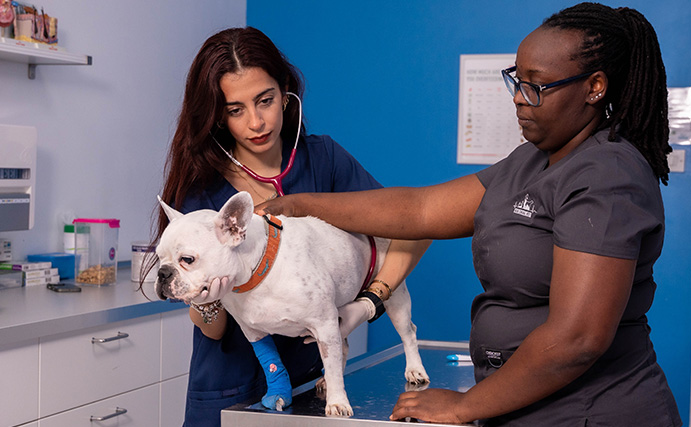Vaccinations
The prevention is at the heart of lifelong wellness, and vaccination is an integral part of that. At Blue Oasis Veterinary Clinic, our staff is dedicated to offering high-quality preventive care, with vaccination being an integral part in keeping pets healthy, safe, and happy.
Vaccinations are among the most effective forms of protecting your dog or cat from various infectious conditions, some of which have a fatal outcome or are very costly to treat. Whether you have a young puppy or kitten, or an adult animal who is due for annual boosters, our full range of vaccination programs provides your animal with all that they require at every stage of their life.
Why Vaccinating Your Pet Is So Important
Vaccines condition your pet’s immune system to be able to combat particular viruses and bacteria. When you get your pet vaccinated, their body produces antibodies that enable them to identify and resist dangerous pathogens when they come into contact with them in the future.

The advantages of routine vaccination include:
- Shielding your pet from severe and even lethal illnesses such as Rabies, Parvovirus, distemper, and leukaemia in cats.
- Reducing the risk of outbreaks and preventing the spread of contagious diseases in the pet community.
- In line with regulations set by Dubai Municipality that mandate vaccination and registration of pets.
- Saving through the prevention of illnesses and thus costly treatments before their occurrence.
- Having assurance that your pet is healthy, safe and secure in many settings, including boarding kennels, dog parks, and even grooming stores, is important.
- Almost all boarding facilities and day-care facilities only accept animals that are fully vaccinated.
Vaccination is not a one-time duty — it is a recurring aspect of your pet’s wellness care. At Blue Oasis, we develop customised vaccine regimens that fit your pet’s lifestyle, age, breed, and health condition.
Senior Pets and Vaccination
Vaccination in older animals is still necessary but requires special precautions. Because immune responses can change with age or disease, we might recommend titer testing or blood-work before boosters are given.
Why vaccination is still necessary for older pets:
- Ongoing Rabies and Parvo protection (mandated by law)
- Immunity can decline over time
- Senior pets can still catch viruses
- Tailored protocols minimise over-vaccination as well as unwanted reactions
At Blue Oasis, we balance disease prevention with senior health, ensuring vaccinations support, not stress, your pet’s ageing body.
Why Choose Blue Oasis for Vaccinations?
We do more than just vaccinate pets — we are your healthcare partner for preventive care for a lifetime. Pet owners throughout Dubai trust us for expert care, compassion, and state-of-the-art veterinary services.
What makes Blue Oasis stand out:
- Tailored vaccination programs according to lifestyle and breed
- Secure, high-quality vaccines given by experienced veterinary practitioners
- Pet-friendly and low-stress
- translucent pricing with packages going as low as AED 350.– (including thorough full body exam, teeth check, ear check, fungal check (in cats) and de-worming)
- Convenient locations in Damas Hills 2 and Dubai Investment Park
- Full adherence to UAE regulations

We spend time examining your pet, responding to your questions, informing you about each vaccination’s purpose and recommend further exams or test if something comes up during the exam — so you and your animal feel secure at each visit.
Frequently Asked Questions
Indeed. In Dubai, it is legally mandatory to vaccinate all dogs and cats against Rabies and dogs against Parvovirus disease. Furthermore, all pets need to be registered with the Dubai Municipality and provide proof of Rabies vaccination as well as microchipping. At Blue Oasis, we do both vaccination and registration to keep your pet up-to-date with local regulations.
Some animals suffer from minor and brief side effects after vaccination. These could be:
- A mild fever
- Fatigue and drowsiness
- Diminished appetite
- Soft enlargement or tenderness at the point of injection
These symptoms usually subside within 24–48 hours. But if your animal is prone to reactions from vaccines, notify us ahead of time so that precautions can be taken.
Our doctors consider your pet’s age, health, lifestyle, and risk of exposure to decide which vaccines are necessary. All animals need core vaccines (such as Rabies and distemper), and non-core vaccines (such as kennel cough or leukaemia in cats) depend on aspects such as travel, outdoor exposure, and interaction with other pets.
Allergic vaccine reactions happen very rarely and typically take the form of facial swelling, vomiting, and shortness of breath. If you observe one of these symptoms take your pet to a veterinary clinic immediately to treat the allergic reaction and prevent further damage to the health of your pet. Inform us if your pet has ever experienced a reaction — we can modify the vaccination plan for safety.
Missing a booster can decrease the immunity of your dog. In case your dog is behind schedule, we might suggest restarting a vaccination series or doing a titer test to test the immunity level. We recommend calling Blue Oasis Veterinary Clinic as soon as possible after you realise a dose was skipped so that we can safely establish a catch-up plan.



